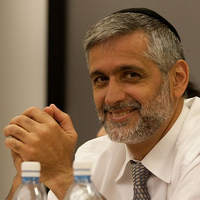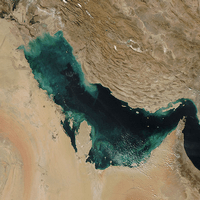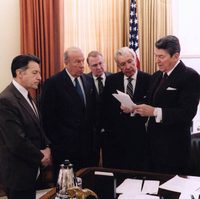The Yemeni government’s efforts to combat domestic terrorism have been complicated by a host of daunting challenges: two internal rebellions, a thriving drug trade, water scarcity, and extreme poverty.In this video, John Brennan, assistant to President Obama for Homeland Security and Counterterrorism discusses Yemen at a Dec. 17, 2010, panel hosted by the Carnegie Endowment for International Peace.
Middle East & North Africa Archive
Free Newsletter
After nine years of war in Afghanistan and seven more in Iraq, Americans are understandably weary of military interventions designed to remake or rebuild failed or fragile states. Nevertheless, many countries are still falling apart, or worse, falling into the hands of fundamentalists, terrorists, and other militants who disregard popular will and care little for human suffering. As a result, such nation-building interventions will remain necessary for the foreseeable future, as the U.S. involvement in Yemen, Somalia and Pakistan demonstrates. So instead of renouncing these missions, the U.S. must better define why and how it will carry them out, to […]
Turkey and the Gulf Cooperation Council (GCC) recently failed to reach agreement on a free-trade agreement (FTA) that has been under discussion since 2005 and that Turkish leaders had hoped would be signed by the end of the year. In an e-mail interview, Hugh Pope, Turkey/Cyprus project director for the International Crisis Group and author most recently of “Dining with al-Qaeda: Three Decades Exploring the Many Worlds of the Middle East,” discusses Turkey-GCC relations. WPR: How would you characterize political relations between Turkey and the GCC member states? Hugh Pope: The political relationship between Ankara and the GCC is very […]
It has been said that the transition of power is the weakest part of democracy. If developments surrounding Egypt’s recent parliamentary elections are any indication, the same might also be true — at least in some paradoxical sense — for authoritarian governments. Outside analysts generally agree that the country’s Nov. 28 elections were wracked by widespread fraud and poll-rigging, resulting in a nearly across-the-board victory for President Hosni Mubarak’s ruling National Democratic Party (NDP). However, as the nation’s crippled opposition now bands together to form a “shadow parliament,” the extent to which the ruling party will be able to use […]

In late-November, a 40-car motorcade drove through New York City toward Presbyterian Hospital, bringing Saudi King Abdullah along with dozens of his accompanying princes and dignitaries to an important medical appointment. The 86-year-old king, whose entourage reportedly took over the hospital’s entire VIP floor and much of the Waldorf-Astoria Hotel, had come to New York for surgery on a slipped disk and a blood clot pressing on nerves in his back, according to palace officials. The medical treatment would keep the king away from his duties for many weeks, and, as with any patient of that age, there was a […]
To follow up on my WPR column from Friday, at the last minute, several of the countries that earlier in the week had signaled they would boycott the Nobel Peace Prize ceremony for Liu Xiaobo reversed their positions before the start of the ceremony. Serbia found itself caught between its close relations with China — which has steadfastly supported Belgrade’s position on Kosovo — and its desire to pursue integration with the European Union. Serbia’s initial decision to honor the Chinese demarche was not welcomed by the European Union, and this past Thursday, in Belgrade, EU Enlargement Commisioner Stefan Fule, […]

The decision by FIFA, soccer’s world governing body, to award the 2022 World Cup to Qatar was momentous on many levels, but historic on one key score: Never before has a global sporting event of such stature been awarded to a country so clearly stuck in a “bad neighborhood” like the Persian Gulf, where the potential for large-scale regional war between now and 2022 is far from theoretical. FIFA’s decision was bold alright, but it also signals the international community’s growing faith in what Gulf Cooperation Council countries like Qatar have achieved in promoting economic and network connectivity with the […]
U.S. Secretary of State Hillary Rodham Clinton speaks at the Brookings Institution’s Saban Center for Middle East Policy Seventh Annual Forum in Washington, D.C., on December 10, 2010.
Egypt recently opened a consulate in Erbil, making it the first Arab country with diplomatic representation in Iraqi Kurdistan. In an e-mail interview, Michael Wahid Hanna, a fellow and program officer at the Century Foundation, discussed Egypt-Iraq relations. WPR: Historically, how would you characterize bilateral relations between Egypt and Iraq? Michael Wahid Hanna: Following a rupture over Anwar Sadat’s overture to Israel in 1977, bilateral ties between Egypt and Iraq improved due to Egyptian support for Iraq in its protracted war with Iran. But relations were dealt a subsequent blow by Egypt’s decision to take a military role in the […]

The foreign firefighters have received their commendations, packed their bags, and headed home after helping to extinguish the worst forest fire in Israeli history. But now that the flames of the Carmel forest have been consigned to the crowded recesses of the nation’s most-painful memories, now that relatives of the 42 people killed in the inferno have buried their loved ones, a new firestorm — this one a political conflagration — is beginning to rage in Israel. All major natural disasters bring political consequences, and every politician wants to avoid being blamed for them. But sometimes even the most media-savvy […]

The recent revelation that a computer worm called Stuxnet had caused disruption to the Iranian nuclear program has raised concerns about the unintended consequences of so-called cyber war. It has also caught the attention of nation states and others as Stuxnet has proven to be a truly disruptive cyber weapon. We have witnessed the true dawn of cyber war. Noted cyber security specialist Bruce Schneier recently wrote that cyber arms “agreements are badly needed” and that it is “not too late to reverse the cyber arms race currently under way.” Schneier is not alone in this call. For several years […]

This weekend, Saudi Arabia will gather Gulf Cooperation Council (GCC) countries and other Middle Eastern states to collaborate on fighting the spread of weapons of mass destruction to terrorist organizations. The Saudi initiative reaffirms that regional cooperation is an emerging and powerful facet of international politics, and that regional organizations are a proven force against international security threats. This is not just hyperbole; there is ample evidence worldwide to back it up. Regional teamwork is best illustrated by the progress made in Europe, where the European Union synchronizes policies and resources to combat security threats worldwide. The regional approach to […]

Two developments this week illustrated the “one step forward, one step back” nature of global nuclear nonproliferation efforts. On the one hand, Iran announced further progress in its domestic nuclear program, increasing Tehran’s potential ability to make nuclear weapons should it ultimately decide to do so. On the other, the International Atomic Energy Agency (IAEA) took an important step toward discouraging the further spread of uranium-enrichment technologies, which could be used to pursue nuclear weapons capabilities, by voting to establish the first completely multinational nuclear fuel bank. Although the IAEA move will not solve the immediate problem presented by Iran, […]

At this week’s Organization for Security and Cooperation in Europe summit in Astana, Kazakhstan, U.S. Secretary of State Hillary Clinton declared that the unauthorized release of U.S. diplomatic documents by the Wikileaks organization “will not in any way interfere with American diplomacy or our commitment to continuing important work that is ongoing.” Clinton is correct: The vital work of international affairs will continue. Diplomacy will not grind to a halt because of the leaks, most of which fall under the category of what Paul Pillar describes as “titillation.” But although the embarrassment will fade away with time, will things then […]
